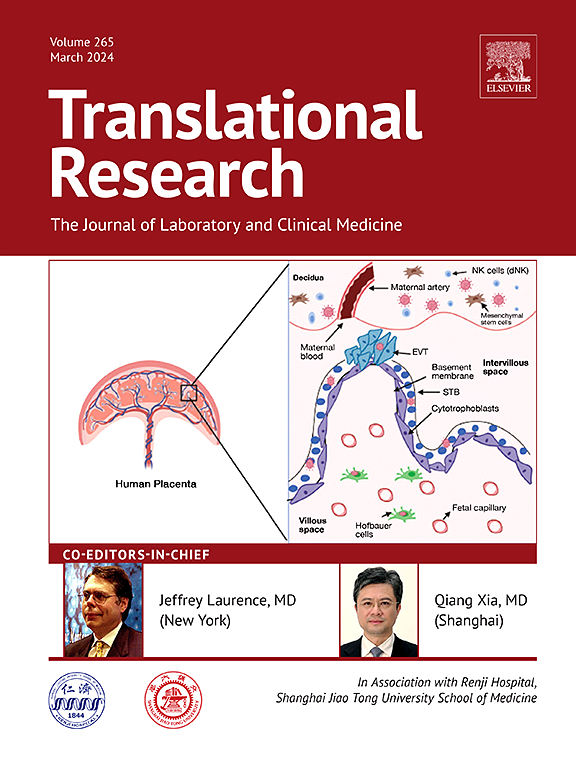载脂蛋白 A1 编码重组腺病毒重塑肿瘤和肿瘤微环境中的胆固醇代谢,从而抑制肝细胞癌。
IF 5.9
2区 医学
Q1 MEDICAL LABORATORY TECHNOLOGY
引用次数: 0
摘要
肝细胞癌(HCC)是一种普遍存在的恶性肿瘤,需要有效的治疗方法。溶瘤病毒可诱导抗肿瘤反应,但疗效有限。载脂蛋白 A1(ApoA1)具有抑制炎症、调节免疫和促进抗氧化的作用。我们利用公共数据库分析了载脂蛋白A1在肿瘤中的表达及其预后意义。随后,我们设计了重组溶瘤腺病毒 Ad5-ApoA1,并在体外和裸鼠体内评估了其复制和溶瘤效果。通过流式细胞术、转录组测序、单细胞测序等方法评估了 Ad5-ApoA1 对 HCC 肿瘤微环境的影响。此外,还探讨了 Ad5-ApoA1 调节免疫微环境的机制。载脂蛋白A1的表达随着HCC的进展而下调,并与HCC患者的预后呈显著正相关。Ad5-ApoA1 具有很强的溶瘤活性,但对裸鼠没有治疗作用。但是,它能明显抑制健康免疫小鼠和人源化免疫重组 NCG 小鼠的 HCC 生长并延长其存活期。此外,Ad5-ApoA1 还能明显促进 CD8+ T 细胞中 IFN-γ 和 GzmB 的表达,同时抑制 PD-1 和 LAG-3 的表达。值得注意的是,所研究的 CD8+ T 细胞中的胆固醇含量与 PD-1 和 LAG-3 的表达明显相关,载脂蛋白 A1 可促进胆固醇外流并降低胆固醇水平。Ad5-ApoA1 通过促进大规模病毒复制来激活 CD8+ T 细胞。高水平的载脂蛋白A1蛋白表达可促进胆固醇外流,抑制CD8+ T细胞耗竭,减少炎症因子,最终对肝细胞癌产生卓越的治疗效果。本文章由计算机程序翻译,如有差异,请以英文原文为准。
Apolipoprotein A1-encoding recombinant adenovirus remodels cholesterol metabolism in tumors and the tumor microenvironment to inhibit hepatocellular carcinoma
Hepatocellular carcinoma (HCC) is a prevalent malignant tumor requiring effective treatments. Oncolytic viruses induce anti-tumor responses but have limited efficacy. Apolipoprotein A1 (ApoA1) inhibits inflammation, modulates immunity, and promotes anti-oxidation. This study aims to construct an oncolytic adenovirus (Ad5)-ApoA1 for superior anti-tumor effects. We analyzed ApoA1 expression in tumors and its prognostic significance using public databases. Subsequently, we engineered a recombinant oncolytic adenovirus Ad5-ApoA1 and assessed its replication and oncolytic efficacy in vitro and in nude mice. The impact of Ad5-ApoA1 on the tumor microenvironment of HCC was evaluated through flow cytometry, transcriptome sequencing, single-cell sequencing, and other methodologies. Additionally, mechanisms of immune microenvironment modulation by Ad5-ApoA1 were explored. ApoA1 expression was down-regulated with HCC progression and significantly positively correlated with the prognosis of HCC patients. Ad5-ApoA1 exhibited robust oncolytic activity but showed no therapeutic effect on nude mice. However, it significantly inhibited HCC growth and prolonged the survival period of both healthy-immune and humanized immune-reconstituted NCG mice. Furthermore, Ad5-ApoA1 significantly promoted the expression of IFN-γ and GzmB in CD8+ T cells while inhibiting the expression of PD-1 and LAG-3. Notably, the cholesterol content in the CD8+ T cells studied was significantly correlated with the expression of PD-1 and LAG-3, with ApoA1 promoting cholesterol efflux and reducing cholesterol levels. Ad5-ApoA1 activates CD8+ T cells by promoting large-scale viral replication. High levels of ApoA1 protein expression promote cholesterol efflux, inhibit CD8+ T cell depletion, and reduce inflammatory factors, ultimately leading to superior therapeutic effects on hepatocellular carcinoma.
求助全文
通过发布文献求助,成功后即可免费获取论文全文。
去求助
来源期刊

Translational Research
医学-医学:内科
CiteScore
15.70
自引率
0.00%
发文量
195
审稿时长
14 days
期刊介绍:
Translational Research (formerly The Journal of Laboratory and Clinical Medicine) delivers original investigations in the broad fields of laboratory, clinical, and public health research. Published monthly since 1915, it keeps readers up-to-date on significant biomedical research from all subspecialties of medicine.
 求助内容:
求助内容: 应助结果提醒方式:
应助结果提醒方式:


